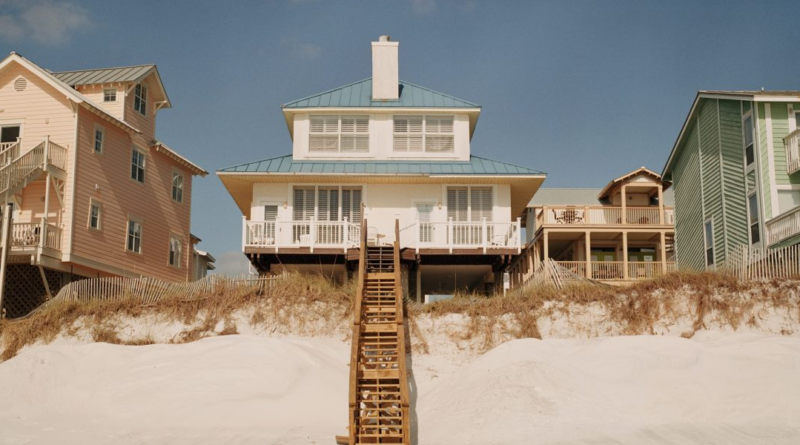Trouble awaits Florida’s housing market as the state just lost another home insurer
This week, AAA announced that it’d “made the difficult decision to not renew a very small percentage of higher exposure homeowner’s policies in Florida,” according to the company statement provided to Fortune—because of, what it called, a “challenging” insurance market. Unlike Farmers, which announced its decision earlier this month, AAA will continue to write new home policies in Florida, aside from those it’s choosing not to renew.
Given that Farmers is not the first home insurer to stop offering coverage in Florida over the past year or so, things are looking challenging for its housing market, and particularly, its homeowners that are already paying the highest insurance premiums in the nation, with an average premium of $6,000 per year versus the U.S. average of $1,700 per year, according to Mark Friedlander, Florida-based director of corporate communications for the Insurance Information Institute. That’s 42% higher than the year prior, Frielander added.
“Just in the last 18 months, 15 companies have stopped writing business in Florida, three have voluntarily withdrawn—Farmers being the most recent, and seven companies have been declared insolvent,” Friedlander explained to Fortune just before AAA’s decision was made public.
The exodus, which the Insurance Information Institute calls a “man-made crisis,” is driven by two key factors in its view: legal system abuse and claim fraud.
“Florida’s property insurance industry has not posted positive financial results since 2016,” Friedlander said. “Last year alone, the industry posted a $1.4 billion underwriting loss and $900 billion net income loss. The underwriting losses have averaged more than $1 billion per year for the last three years. So it’s been a very paralyzed market for insurers. And it’s not a sustainable model to operate in the state. If you keep losing that much money, year after year, it becomes very challenging.”
Ken H. Johnson, a former real estate broker and current associate dean of graduate programs at Florida Atlantic University—whose research focuses on real estate economics, pointed to insurance claims that result in litigation. Citing data from Florida’s Office of Insurance Regulation, Johnson told Fortune that last year, 79% of home ownership lawsuits occurred in Florida. That’s costly for insurance companies, and a lot of what they’re paying goes toward legal fees rather than the damage itself, he said. That being said, insurers are leaving the state, and those that are staying seem to be consistently increasing their premiums to offset their losses. And it doesn’t help that most Florida housing markets saw home prices jump over 50% between March 2020 and April 2023 (see map below), while mortgage rates are now hovering around 7% after a short-lived era of historically low rates during the pandemic.
“The cost of homeownership is already way above where it should be,” Johnson said. “We pay really high homeownership prices, and on top of [that] at really high interest rates, approaching 7%. And then on top of that, we’re going to add very expensive homeowners insurance. So affordability is going to become a dramatic question for, I believe, several years.”
Florida’s insurance consumer advocate, Tasha Carter, who was appointed by Florida’s chief financial officer, Jimmy Patronis, listed four factors behind the homeowner insurance market that she said is in “dire condition.” The first has to do with claims from recent hurricanes, given hurricane Irma, Michael, and Ian (combined) generated nearly 3 million claims filed and resulted in approximately $46 billion in estimated insured losses. Then, there’s reinsurance rates that have gone up 52% on average in the last year, which results in increased costs to policyholders in the form of higher premiums. Next, there’s an increase in litigation involving insurance companies, which also results in increased costs to policyholders. And the last factor comes down to insurance fraud.
In what seems to be a defense of its decision, in AAA’s statement it said: “Florida’s insurance market has become challenging in recent years. Last year’s catastrophic hurricane season contributed to an unprecedented rise in reinsurance rates, making it more costly for insurance companies to operate. Prior to that, the market was already strained by an increase in claims costs due to inflation and excessive litigation.” Farmers, on the other hand, did not explain its decision beyond doing so to manage risk exposure.
It’s clear that there’s several factors at play, and it all culminates in homeowners having less options in terms of insurance coverage.
“The homeowners insurance market is continuously shrinking and becoming more and more restricted, with less capacity,” Carter told Fortune. “And that means it is becoming more and more difficult for consumers to find homeowners insurance coverage.”
In this sort of postmortem period, as Johnson put it, he doesn’t know exactly how to feel about Farmers leaving the state. More so, he’s curious about the relationship the company had with its reinsurers, given reinsurers’ capital declined by 15% in 2022.
Farmers Insurance’s subsidiaries will continue to operate within the state, and the company claims only 30% of policies will be affected by its decision to discontinue its Farmers-branded auto, home, and umbrella policies in Florida. Still, theoretically, the less competition there is among insurers, the more control they have over the market. How that’ll play out in terms of individual costs is unclear, Friedlander seems to think that more consumers will look to Citizens Property Insurance, which he said is a state-backed insurer of last resort, and end up with that coverage (particularly if their company fails or leaves Florida, like Farmers Insurance). In that case, Citizens Property Insurance is lower than private market rates, around 40% less, Friedlander said, which is a problem in itself because of the pace at which it’s growing—but that’s for another day.
Jason Damm, an assistant professor of professional practice of finance at the University of Miami, owns an investment property in Miami that has two separate houses on it (both of which he rents out). He renewed his insurance in April, and his premium went up 25%. A month later, Damm said the insurance company sent him a notice that it was pulling out of the state. By June 30, his policy was canceled.
“I don’t have insurance on the house, which is quite dangerous,” Damm said. “I’ve been looking, it’s very expensive, so I’m trying to decide what to do… it’s a huge problem. I mean, I don’t know what I’m going to do with it, whether I’m going to try and find a policy or just go without insurance.”
I don’t have to explain how risky it is to go without home insurance, let alone in a place like Florida that’s prone to natural disasters, yet people are doing it. Carter spoke to a consumer recently who told her she is thinking about self-insurance, even though she doesn’t have the financial means to repair or rebuild her home if a natural disaster were to strike. Still, in order to meet her other financial demands, this is what she feels she has to do.
Companies are also becoming more selective of the homes they insure, Carter said. They’re looking at the roof conditions, and the age of roofs, along with the overall age of homes. Consumers with roofs over 10 to 15 years old are having a hard time finding coverage, and in some cases, are being asked to replace their roofs to secure coverage, Carter said. Others are limiting the age of homes they’re willing to insure, with some companies choosing to only insure newly built homes and homes built within the last five years.
“Consumers are experiencing an increase in their insurance premiums,” Carter said. “They’re really shocked when they receive their renewal notices…what we’re seeing is for those companies who are willing to remain in the state and who are willing to write homeowners insurance coverage, unfortunately, that coverage comes with a very, very high price tag that is making it very difficult for consumers to be able to afford [it].”
In Johnson’s view premiums are likely to continue to increase until legislation, that’s already in effect, takes hold—and it’s not a quick and easy process because this legislation isn’t retroactive. Still, in the meantime this exodus of home insures is only going to worsen affordability.
“It’s going to drive up the cost, which is just going to prolong this affordability crisis that has developed in Florida,” Johnson said.



